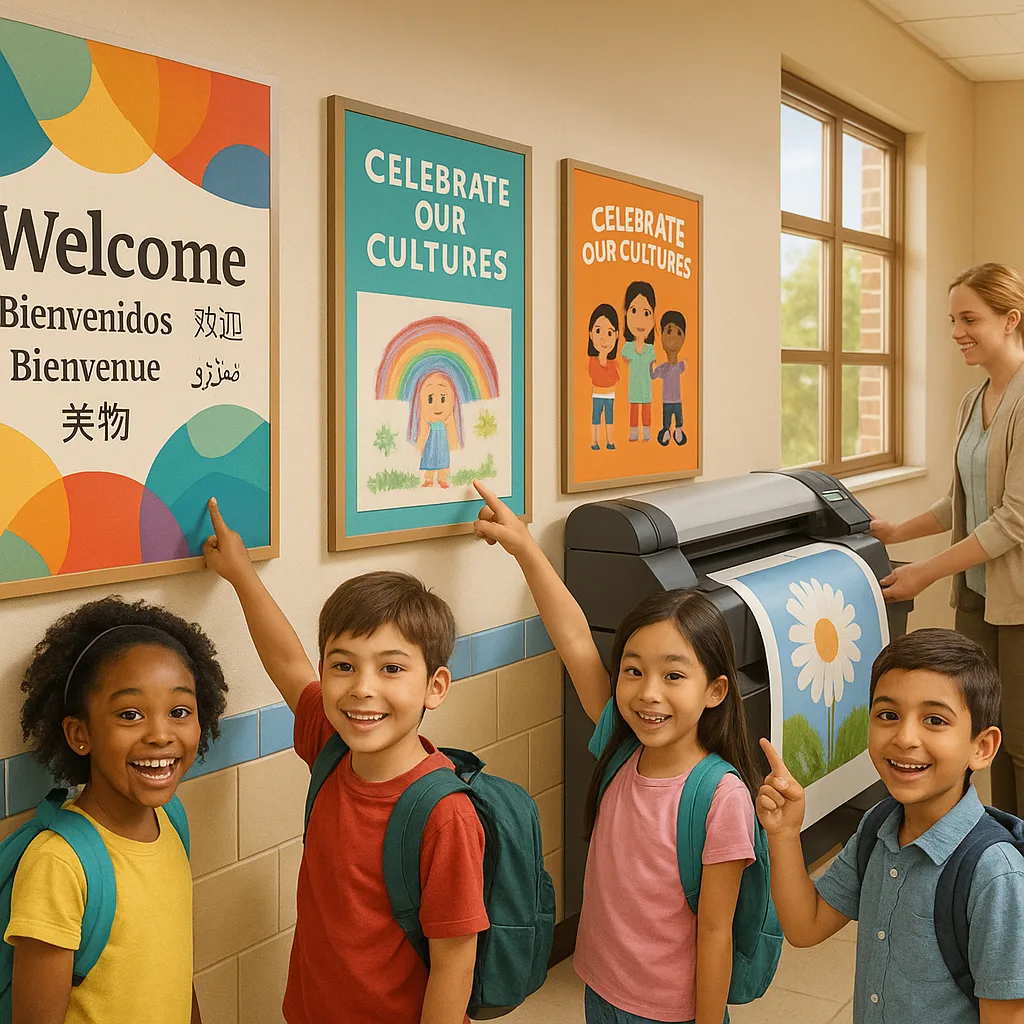Poster Makers for Schools Build Belonging
Understanding the Belonging Crisis in Our Schools
Recent research from the National Center for Education Statistics reveals a startling truth. Specifically, over 40% of students report feeling disconnected from their school community. Moreover, this isolation particularly affects students from marginalized backgrounds, English language learners, and those with learning differences. Consequently, these feelings of disconnection lead to decreased academic performance, increased absenteeism, and higher dropout rates.
However, there’s hope on the horizon. Additionally, neuroscience research from Stanford University shows that visual affirmations and inclusive imagery activate the brain’s reward centers. Therefore, when students see themselves represented positively in their environment, it triggers the release of dopamine and oxytocin. Subsequently, these “belonging hormones” enhance learning capacity, emotional regulation, and social connection.
The Research Behind Visual Belonging
Dr. Carol Dweck’s groundbreaking studies on growth mindset intersect beautifully with visual learning research. Particularly, her team found that students exposed to diverse, affirming visual displays showed 23% higher resilience scores. Furthermore, these students demonstrated increased willingness to take academic risks and seek help when needed.
The University of Michigan’s School Climate Research Partnership adds another layer to our understanding. Specifically, their five-year longitudinal study tracked 15,000 students across diverse districts. Remarkably, schools implementing comprehensive visual inclusion campaigns saw:
These statistics aren’t just numbers—they represent real lives transformed. Therefore, when schools invest in creating inclusive visual environments, they’re investing in their students’ futures.
Creating Research-Backed Visual Campaigns with Poster Makers for Schools Belonging
Let’s explore how to design and implement visual belonging campaigns that truly make a difference.
Strategic Poster Placement: The Psychology of Space
Environmental psychology teaches us that space shapes behavior. Therefore, where you place your inclusive posters matters as much as what they contain. Dr. Steele’s research on stereotype threat demonstrates that strategic visual placement can either reinforce or challenge unconscious biases.
Consider these evidence-based placement strategies:
Entry Points
Maximum Impact
Place welcoming messages and diverse representations at all school entrances. First impressions create lasting neural pathways.Transition Zones
Reinforcement Points
Hallways, stairwells, and cafeterias offer repeated exposure opportunities. Students process these messages subconsciously throughout the day.Learning Spaces
Deep Integration
Classroom posters should reflect current learning while celebrating diversity. This integration normalizes inclusion as part of academics.Evidence-Based Design Elements for Maximum Impact
Creating posters that genuinely foster belonging requires more than good intentions. Therefore, let’s examine the research-backed design principles that maximize psychological impact:
Color Psychology in Inclusive Design
Research from the Institute for Color Research reveals that color choices significantly impact emotional response and memory retention. Specifically:
• Warm colors (reds, oranges, yellows) increase energy and attention but should be balanced to avoid overstimulation
• Cool colors (blues, greens, purples) promote calm and focus, ideal for areas requiring concentration
• Earth tones create feelings of stability and connection to nature
• High contrast improves readability for students with visual processing differences
Furthermore, cultural color associations vary significantly. Therefore, involving your diverse student body in color selection ensures cultural sensitivity and authentic representation.
Typography That Speaks to Everyone
Font selection impacts both readability and emotional response. Moreover, research shows:
• Sans-serif fonts improve readability for dyslexic students by 35%
• Consistent font hierarchy reduces cognitive load
• Adequate white space increases comprehension by 20%
• Mixed case text reads 13% faster than all capitals
Additionally, consider creating posters in multiple scripts when celebrating linguistic diversity. Subsequently, students see their home languages valued alongside English, reinforcing belonging through linguistic inclusion.
Measuring the Impact of Your Visual Belonging Campaign
Students reporting increased school connection after visual campaign implementation
Teachers noting improved classroom climate with inclusive posters
Reduction in reported incidents of exclusion and bullying
Parents feeling more welcomed and connected to school community
Practical Implementation: Your 30-Day Belonging Campaign
Let me share a practical roadmap for launching your own visual belonging initiative. First, this timeline has been tested in dozens of schools with remarkable success:
Survey students, families, and staff about belonging experiences. Additionally, identify gaps in representation and create your poster content calendar.
Collaborate with students to design posters using your poster maker machine. Furthermore, ensure diverse voices shape the creative process.
Install posters following research-based placement strategies. Moreover, host a school-wide celebration to launch the campaign.
Gather feedback through follow-up surveys and focus groups. Subsequently, adjust your approach based on student and community input.
Moving Forward: Your Next Steps
The science is clear: visual environments profoundly impact student belonging and success. Therefore, every day without inclusive visual representation is a missed opportunity to affirm your students’ worth and potential. Additionally, with the right tools and strategies, you can transform your school’s culture starting today.
Consider starting small with a pilot program in one grade level or hallway. Subsequently, as you witness the positive impacts, expand your visual belonging campaign school-wide. Most importantly, remember that this isn’t just about pretty posters—it’s about creating environments where every student knows they matter.
The investment in a quality poster maker for schools pays dividends in student wellbeing, academic achievement, and community cohesion. Furthermore, when you compare the cost of outsourcing poster creation to having your own in-house capabilities, the financial benefits become clear. Check out our total cost of ownership calculator to see the savings for yourself.

